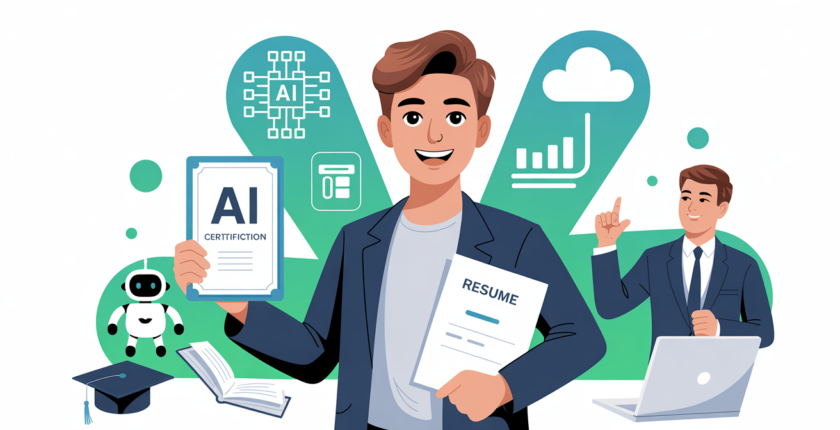The Role of AI Certifications in Landing Your First Job
The Role of AI Certifications : Artificial Intelligence (AI) has emerged as one of the most sought-after competencies in today’s labor market, making it no more a future idea. AI is influencing sectors all across the world, from chatbots and recommendation engines to self-driving cars and healthcare forecasts. This change has given recent graduates and job seekers a fantastic opportunity to enter AI-driven employment. The difficulty, however, is in demonstrating your abilities in a cutthroat setting where everyone is keen to share their expertise.
Certifications in AI are essential in this situation. Employers now seek individuals who exhibit real experience with AI tools, frameworks, and projects, even though college degrees and rudimentary programming ability are still crucial. When recruiters are shortlisting resumes for AI-related positions, a certification from a reputable platform not only confirms your abilities but also makes your resume stand out.
Recruiters are looking for experts who can use AI to address real-world challenges, not simply those with theoretical expertise, in today’s competitive job market. Freshmen can close the gap between academic understanding and professional expectations by obtaining certificates. AI certificates can be the first step toward your ideal career, regardless of your career goals—whether they are in computer vision, machine learning, or natural language processing.
Why AI Certifications are Needed in This Generation
1. Bridging the Skill Gap
The majority of college curricula merely cover the fundamentals of programming and AI. However, practical skills like using TensorFlow, PyTorch, or natural language processing models are the main focus of certifications. By matching them with what employers want from entry-level AI workers, this prepares new hires for the workforce.
2. Enhancing Employability
Certifications provide a fresher’s résumé more legitimacy in the increasingly competitive field of artificial intelligence. They increase a candidate’s appeal to recruiters and act as evidence of skill. Their increasing significance is demonstrated by the fact that “certification in AI/ML” is frequently mentioned specifically as a preferred qualification in job descriptions.
3. Building Confidence with Real-World Projects
Case studies and real-world projects are a common feature of AI certification programs. In addition to honing technical abilities, these initiatives give new hires the self-assurance they need to talk about real-world problem-solving situations during interviews, which is highly valued by employers.
Top 10 AI Jobs for Freshers in 2025: Kickstart Your Career in Artificial Intelligence
4. Staying Ahead in a Fast-Evolving Industry
AI is developing at a breakneck pace, and certifications assist new hires in keeping abreast of the newest developments in tools, technologies, and trends. Certification providers frequently update their course materials to reflect industry demands, in contrast to traditional degrees that update more slowly.
5 Best AI Certifications for Freshers
1. Google Professional Machine Learning Engineer
One of the most prestigious certifications in the field of artificial intelligence is that of Google. Students are exposed to cloud-based AI workflows through its focus on creating, developing, and implementing machine learning models on Google Cloud. The course’s practical component helps freshmen by preparing them for positions in both start ups and well-established businesses.
Additionally, this certification attests to a candidate’s proficiency with practical machine learning solutions. Employers view this certification as evidence of a candidate’s preparedness for AI-driven positions because Google Cloud is extensively utilized across industries.
2. IBM Applied AI Professional Certificate
For novices, IBM’s Applied AI certification on sites like Coursera is perfect. Along with interactive labs utilizing IBM Watson, it presents fundamental AI ideas like machine learning, computer vision, and natural language processing. This course will be helpful for new students who want a moderate introduction to AI with validation from the industry.
Applied skills are prioritized over extensive theory in this certification. Freshmen who finish it get hands-on experience creating basic chatbots, visual recognition models, and AI-powered applications, which greatly enhances their resume when they apply for jobs.
Sam Altman’s Shocking AI Prediction: “These Jobs Won’t Exist Soon”
3. Microsoft Azure AI Fundamentals (AI-900)
The AI-900 certification from Microsoft is a fantastic place to start for anyone who wish to work in the AI sector through cloud computing. With an emphasis on Azure-based solutions, it covers the foundations of AI, including computer vision, natural language processing, and responsible AI. For businesses that use Microsoft technologies, this makes it extremely relevant.
The certification is ideal for new hires because it is easy to learn and doesn’t require sophisticated coding abilities. Additionally, it lays the groundwork for more complex Azure certifications, allowing applicants to pursue a long-term career in cloud computing and artificial intelligence.
4. Stanford University’s Machine Learning (Coursera)
One of the most well-liked AI certificates in the world is Stanford’s machine learning course, which was developed by Andrew Ng. Despite being a course rather than a professional diploma, it is well respected in the field. Newcomers acquire solid foundations in neural networks, supervised and unsupervised learning, and the essentials of deep learning.
Because it is taught by one of the most prominent AI professors, recruiters value the credential. In addition to increasing technical proficiency, completing this program shows employers that a candidate is dedicated to developing their AI skills.
5. Udacity’s Artificial Intelligence Nanodegree
The AI Nanodegree offered by Udacity is very useful and project-focused. It enables students to work on tasks like creating computer vision models, generating AI agents, and putting NLP applications into practice. This provides new hires with a portfolio of their work to present at interviews.
The career assistance and mentoring offered by this qualification are additional benefits. In addition to technical education, freshmen gain from expert advice on how to adapt their resumes and job applications for AI positions.
Conclusion
AI certifications are no longer optional—they are becoming a necessity for freshers entering today’s competitive job market. These certifications bridge the skill gap, boost employability, provide exposure to real-world projects, and ensure that candidates stay updated in an ever-evolving industry. By investing in certifications like those from Google, IBM, Microsoft, Stanford, or Udacity, freshers can set themselves apart and confidently apply for AI jobs.
In this generation, where AI skills are in high demand, a certification acts as your golden ticket to interviews, better visibility in job applications, and a stronger professional identity. If you are a fresher aiming to launch your career in AI, earning a relevant certification might be the smartest step you can take today.


